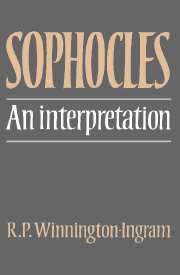Book contents
- Frontmatter
- Contents
- Preface
- Bibliography of short titles
- 1 Introductory
- 2 The mind of Ajax
- 3 The burial of Ajax
- 4 Trachiniae
- 5 Sophocles and the irrational: three odes in Antigone
- 6 Creon and Antigone
- 7 Fate in Sophocles
- 8 The fall of Oedipus
- 9 Furies in Sophocles
- 10 Electra
- 11 Oedipus at Colonus
- 12 Philoctetes
- 13 Heroes and gods
- Appendices
- Select index
11 - Oedipus at Colonus
Published online by Cambridge University Press: 07 December 2009
- Frontmatter
- Contents
- Preface
- Bibliography of short titles
- 1 Introductory
- 2 The mind of Ajax
- 3 The burial of Ajax
- 4 Trachiniae
- 5 Sophocles and the irrational: three odes in Antigone
- 6 Creon and Antigone
- 7 Fate in Sophocles
- 8 The fall of Oedipus
- 9 Furies in Sophocles
- 10 Electra
- 11 Oedipus at Colonus
- 12 Philoctetes
- 13 Heroes and gods
- Appendices
- Select index
Summary
The play has been seen in many lights: as a re-treatment, perhaps a re-thinking, of the Oedipus story, and so in some sense a sequel to the Tyrannus; as an Athenian play, first and foremost, glorifying Athens in her traditional role as protector of the oppressed; as a study in the nature of a heros and the process of becoming one; as the final testament of a poet on the threshold of death. Perhaps all these ways of looking at the play have a legitimate basis, even those which might appear somewhat remote from one another. It is indeed full of clashes and seeming contradictions: between the love of Oedipus for his daughters and his hatred for his sons, between the beauty of the grove of the Eumenides and the terror which it inspires, between Justice and Pity; above all, between the miseries of Oedipus, past and present, and the destiny which awaits him when he goes, attended by the king of Athens, ‘to keep a strange appointment with heaven’. This last has been recognized to be the central mystery. What does it mean? And how is it related to the entire action of a lengthy play? This action – of the longest extant tragedy – is sometimes said to be episodic, which is, I suppose, a polite word for rambling. That the play unfolds with a certain amplitude, a lack of hurry, can hardly be denied, whether or not we choose to attribute this to the old age of a nonagenarian poet. The structure, however, may be tighter and more symmetrical than has always been observed.
- Type
- Chapter
- Information
- Sophocles: An Interpretation , pp. 248 - 279Publisher: Cambridge University PressPrint publication year: 1980



